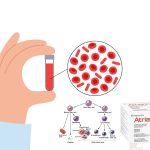Ovarian cancer is a serious and often deadly disease affecting thousands of women globally each year. It is the fifth leading cause of cancer-related deaths among women, with a 5-year survival rate of only 47%. One key reason is that ovarian cancer is often diagnosed at an advanced stage when treatment becomes more challenging. Understanding the risk factors, symptoms, and treatment options is essential to managing this disease.
Risk Factors and Symptoms:
Certain factors can increase the risk of developing ovarian cancer:
- Age: Risk rises with age, especially after menopause.
- Family History: A family history of ovarian, breast, or colorectal cancer raises the risk.
- Genetic Mutations: BRCA1 and BRCA2 gene mutations significantly elevate the likelihood of ovarian cancer, making genetic testing important for those with a strong family history of cancer.
Symptoms of ovarian cancer are subtle and often mistaken for less serious conditions, including:
- Bloating
- Pelvic or abdominal pain
- Difficulty eating or feeling full quickly
- Frequent or urgent urination
These symptoms are concerning if they persist or significantly differ from normal health. Persistent symptoms like fatigue, back pain, pain during intercourse, constipation, and changes in menstrual patterns should prompt a consultation with a healthcare provider.
Current Treatment Options for Ovarian Cancer:
Ovarian cancer treatment typically involves surgery and chemotherapy, often tailored to the cancer’s type and stage.
Surgery: The primary approach to treating ovarian cancer is surgery to remove as much of the tumor as possible, which might include the ovaries, fallopian tubes, and other affected areas.
Chemotherapy: Following surgery, chemotherapy is used to kill the remaining cancer cells. Although effective, ovarian cancer has a high recurrence rate, which requires further therapeutic options to keep the disease under control.
One of the latest advancements in ovarian cancer treatment is the use of targeted therapy, specifically PARP inhibitors like olaparib which is supplied under the brand Lynparza.
Olaparib: A Targeted Approach in Ovarian Cancer
Olaparib, supplied under the brand Lynparza represents a significant breakthrough, especially for those with BRCA gene mutations. As a PARP inhibitor, Lynparza targets an enzyme that helps repair damaged DNA in cancer cells. By blocking this enzyme, Lynparza leaves the cancer cells unable to repair their DNA, ultimately leading to cancer cell death. This targeted approach offers hope for those facing recurrent or advanced-stage ovarian cancer.
Olaparib is used in several roles within ovarian cancer treatment:
- Maintenance Therapy: For women with advanced ovarian cancer who have responded well to platinum-based chemotherapy, Olaparib acts as a maintenance therapy. It helps delay disease progression, offering patients a longer time in remission.
- Recurrent Ovarian Cancer Treatment: For those with recurrent ovarian cancer and BRCA mutations who have undergone multiple chemotherapy rounds, Olaparib is used as a treatment to help manage the disease.
- Combination Therapy: Olaparib is also approved in combination with bevacizumab (Avastin) for first-line maintenance therapy in advanced ovarian cancer with homologous recombination deficiency (HRD). This combination has shown improved outcomes compared to bevacizumab alone, helping extend the period before cancer progresses.
Together with traditional approaches like surgery and chemotherapy, Olaparib is helping transform ovarian cancer management by improving survival times and offering patients new hope for disease control.
What are the early signs of ovarian cancer?
Early signs include bloating, pelvic pain, feeling full quickly, and frequent urination. Since symptoms are subtle, it’s essential to consult a doctor if they persist.
How does Lynparza work in treating ovarian cancer?
Lynparza is a PARP inhibitor, which targets cancer cell DNA repair enzymes. By disrupting these repair mechanisms, Lynparza helps lead to cancer cell death, particularly in BRCA-mutated ovarian cancers.
Can ovarian cancer be detected early?
Early detection is challenging, but awareness of symptoms, family history, and genetic counseling can help. Regular pelvic exams and genetic testing are recommended for women at higher risk.
How can I buy olaparib (Lynparza) in India?
You can buy Olaparib (Lynparza) in India through authorized distributors like the Indian Pharma Network (IPN). For assistance, contact IPN via Call/WhatsApp at +91 9310090915 or their TOLL-FREE helpline at 1800-889-1064.
What are the standard treatments for ovarian cancer?
Standard treatments include surgery and chemotherapy. Targeted therapies like Lynparza offer additional options for advanced cases, helping to manage recurrence and improve survival rates.
Is ovarian cancer hereditary, and how do BRCA mutations impact risk?
Yes, ovarian cancer can be hereditary, especially in women with BRCA1 and BRCA2 mutations. Genetic testing for these mutations is recommended for those with a family history of related cancers to assess their risk.
Where I can buy Olaparib (Lynparza) in India?
You can buy Olaparib online in India through authorized suppliers like the Indian Pharma Network (IPN). IPN facilitates its supply in major Indian cities, including Delhi, Gurgaon, Mumbai, Bangalore, Chennai, Hyderabad, Kolkata, Pune, Ahmedabad, Chandigarh, Jaipur, Lucknow, Bhopal, Indore, Nagpur, and Kochi. For assistance, contact IPN via Call/WhatsApp at +91 9310090915 or their TOLL-FREE helpline at 1800-889-1064.






